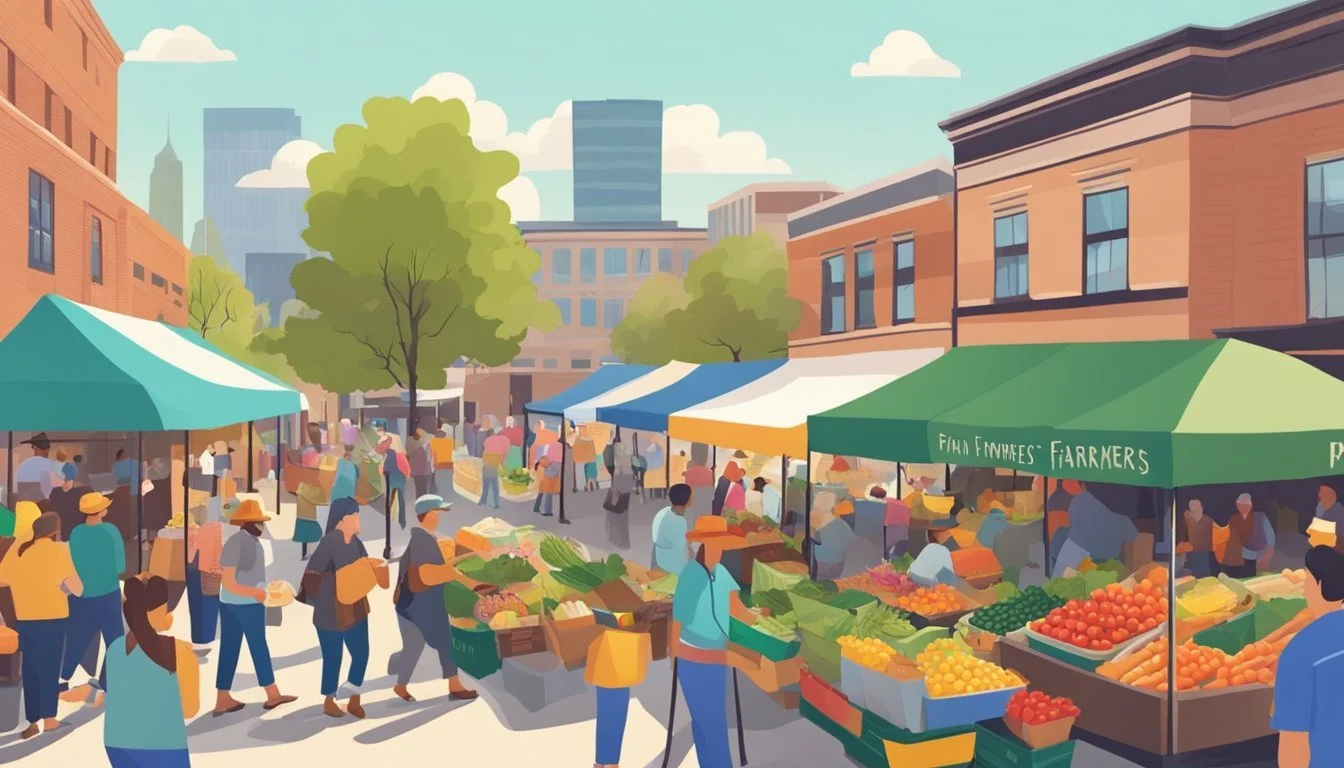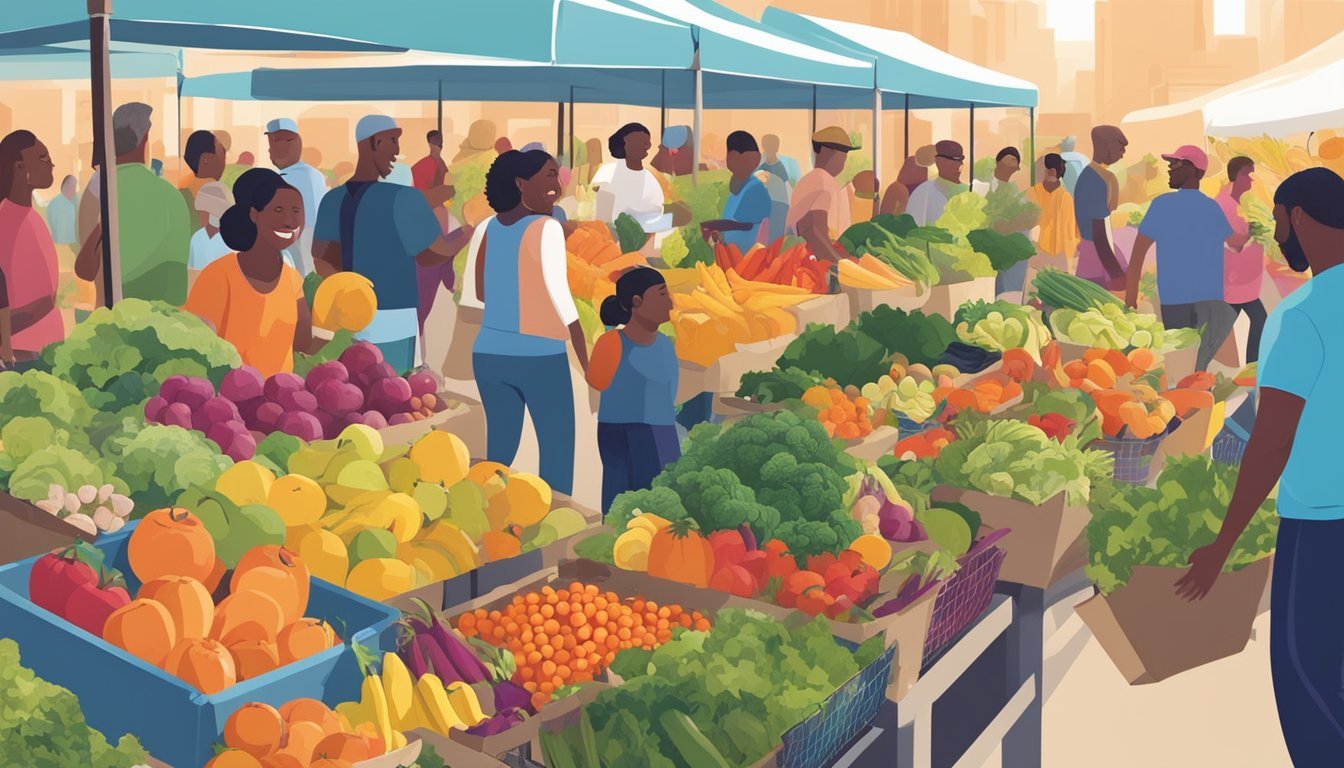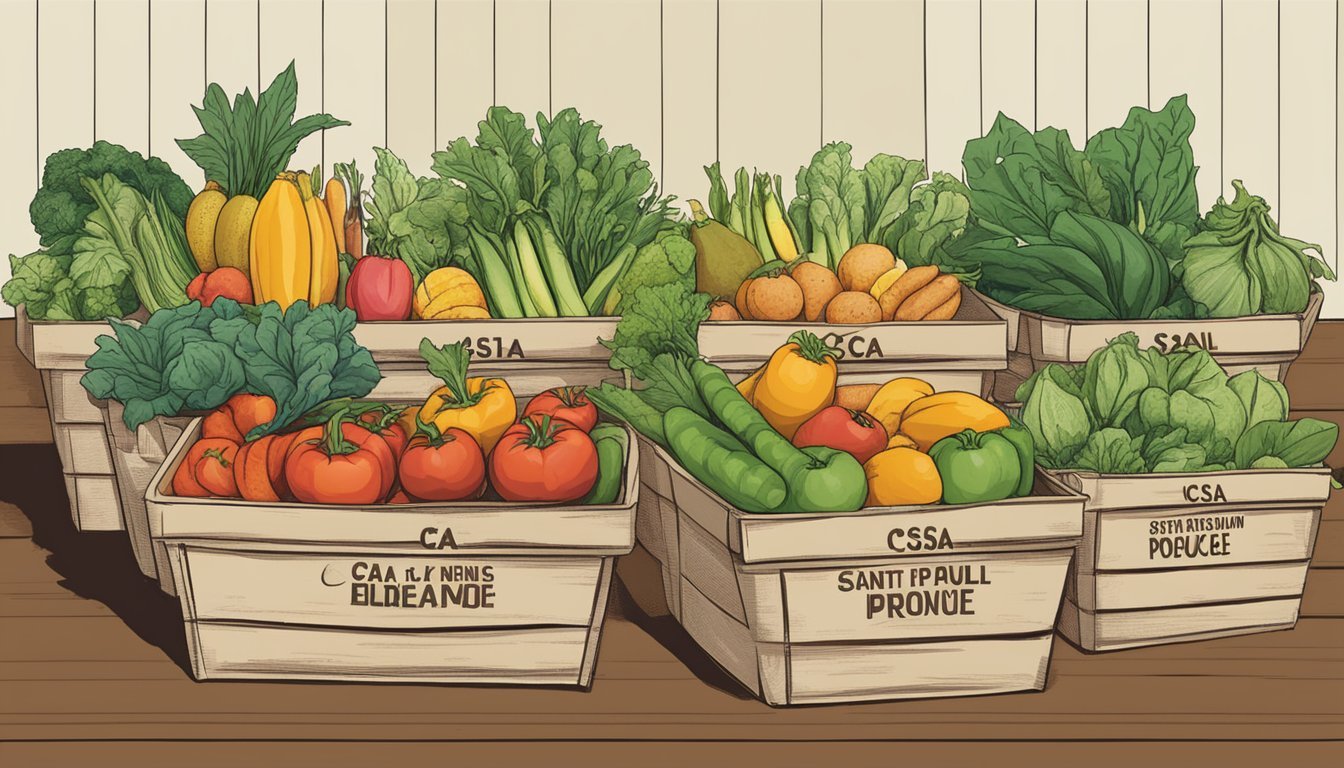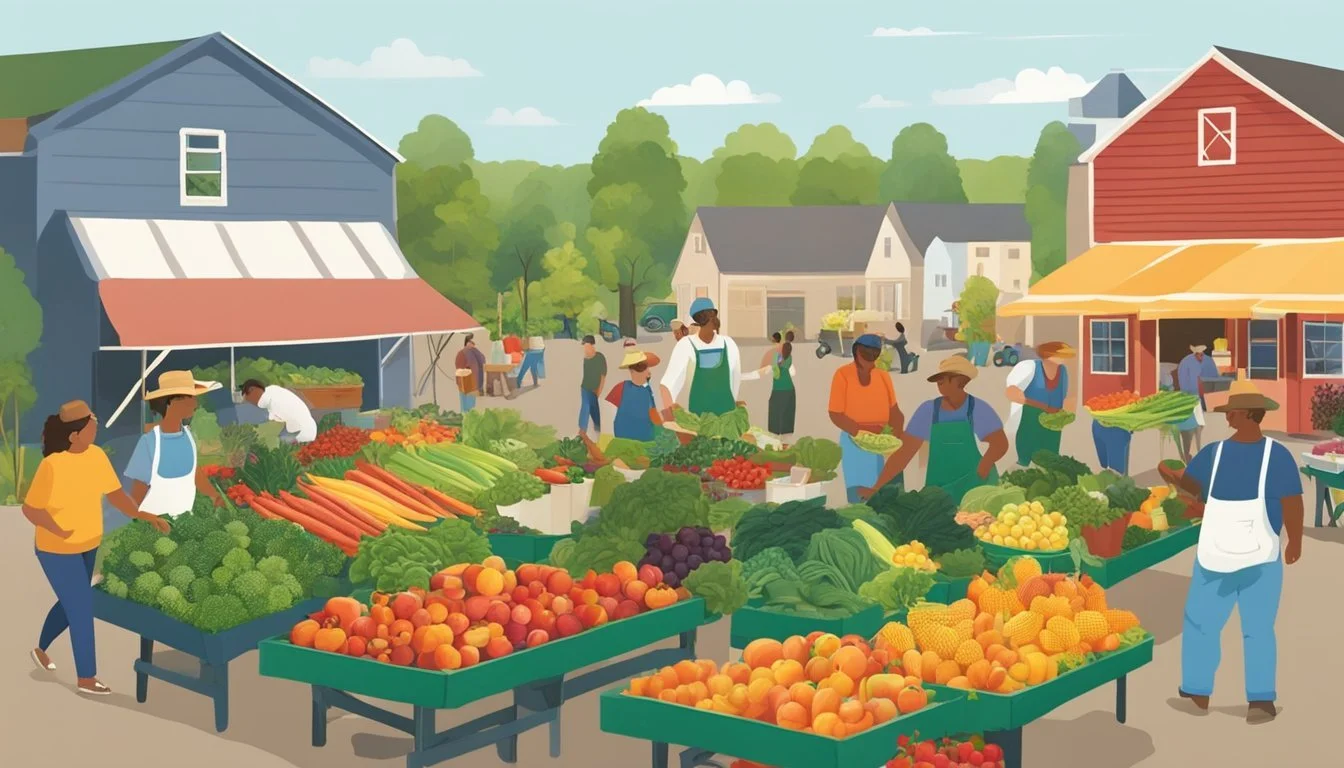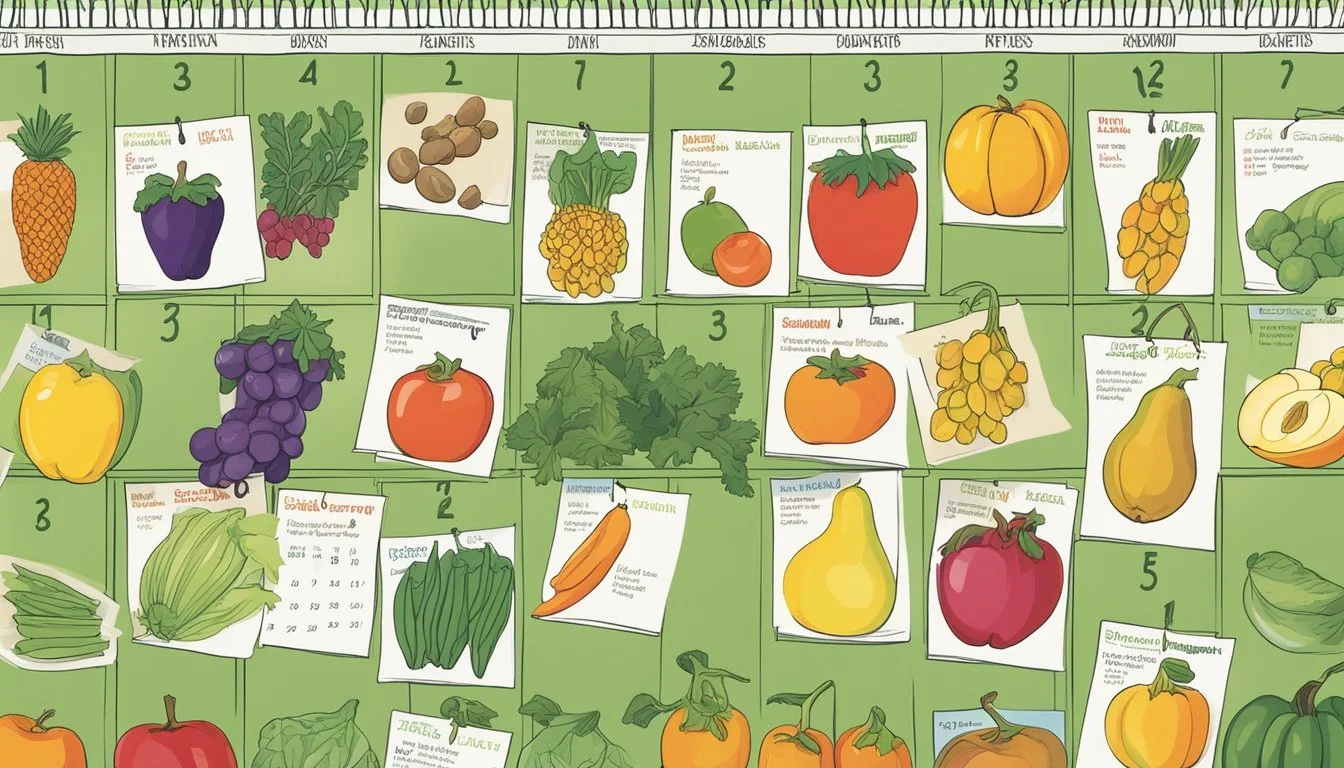Community Supported Agriculture (CSA) in Saint Paul, MN
Nurturing Local Food Systems
Community Supported Agriculture (CSA) has flourished in Saint Paul, Minnesota, as an innovative model for connecting local farmers with consumers. At its core, CSA is a partnership where individuals pledge support to a farm operation, ensuring that both the risk and rewards of farming are shared. The Twin Cities region, with its emphasis on sustainability and local food movements, has become a hub for these CSA programs. They offer residents the chance to invest in their local economy while receiving a share of fresh, seasonally available produce directly from nearby farms.
In Saint Paul, numerous CSA programs have taken root, each with unique offerings that cater to the metropolitan's diverse community. These programs often extend beyond just produce; many integrate meats, cheeses, and other artisanal products by partnering with local producers. The structure of CSA in Saint Paul allows for a direct line of support from consumer to farmer, reinforcing the local food system and fostering a sense of community around agriculture.
Residents of Saint Paul and the broader Twin Cities area enjoy the benefits of CSA programs through various points of access. From the convenience of neighborhood drop-off locations to the full experience of visiting a farm stand, these programs are designed to be as accessible as possible. The CSA model in Saint Paul not only strengthens the relationship between growers and consumers but also promotes environmental stewardship by focusing on sustainable agriculture practices.
What Is Community Supported Agriculture (CSA)?
Community Supported Agriculture (CSA) represents a mutually beneficial relationship where consumers receive fresh produce, such as veggies, fruits, meat, eggs, and bread, directly from local farms. Through this model, community members actively contribute to the livelihood of the farms and, in turn, share in the yield.
Origins of CSA
The concept of CSA began in Japan during the 1960s, spearheaded by a group of women seeking alternatives to the industrialized and pesticide-reliant agricultural system. This initiative aimed to reconnect communities to the very source of their food—local, family-owned farms. By the 1980s, the CSA model had taken root in the United States, aiming to revive small-scale agriculture and foster a closer relationship between consumers and growers.
CSA Model Explained
Under a CSA, consumers become shareholders of a farm's harvest by paying upfront for a "share" at the beginning of the growing season. This financial model provides growers with needed capital and a guaranteed market. In return, shareholders regularly receive a portion of the farm's produce during the season, encapsulating an array of items from veggies to eggs.
CSAs often vary in structure. Most commonly, members receive a weekly or biweekly box of fresh, seasonal produce, but some CSAs also offer additional benefits such as discounted prices for labor contributions or participation in farming activities. Through these models, CSAs foster a robust and resilient local food system by reinforcing the community bond between growers and consumers.
Benefits of Joining a CSA in Saint Paul
Joining a Community Supported Agriculture (CSA) program in Saint Paul provides tangible benefits for both residents and the agricultural community. It fosters a direct link between local farming operations and families seeking fresh, seasonal produce.
Supporting Local Farmers
By participating in a CSA, residents of Saint Paul actively contribute to the financial stability of local farmers. They provide upfront funding that helps farmers plan and manage their seasonal operations with more certainty. This economic relationship bolsters small-scale farms and strengthens the local food economy.
Access to Fresh Produce
CSA members enjoy regular shares of fresh vegetables and fruits, typically harvested at their peak. The proximity of the farms means produce can often be on the table within days of being picked, ensuring maximum flavor and nutritional value. This direct distribution channel minimizes the time between farm and table, a key advantage of CSA programs.
Encouraging Sustainable Practices
CSA programs in Saint Paul emphasize sustainable and, in many cases, organic farming practices. These methods are beneficial to the environment and promote biodiversity. By supporting CSAs, residents invest in a system that values ecological health, often involving crop rotation, natural pest controls, and a reduction of the carbon footprint associated with long-distance transportation of food.
How to Choose the Right CSA in Saint Paul
Choosing the right Community Supported Agriculture (CSA) in Saint Paul requires an understanding of share options, pickup locations, and payment plans. Proper consideration ensures that individuals select a CSA that aligns with their lifestyle needs and supports the community.
Understanding Share Options
In Saint Paul, CSAs offer a variety of share options to fit different household sizes and consumption habits. For example, a family share is often suitable for larger households or those who consume a significant amount of vegetables, while a standard share caters to the average family. Some CSAs, such as those mentioned in the search results, even offer a teaser share, ideal for smaller households or as a trial option. The cost of these shares can vary, and it's essential to consider the quantity of produce needed when selecting a share.
Evaluating Pick-Up Locations
CSAs commonly have multiple pickup locations to accommodate their members. It's crucial for individuals to consider the convenience of these locations in relation to their homes or workplaces. For example, a CSA that attends St. Paul farmers markets or has a stand accessible from June through November provides flexibility for pickup. Prospective members should inquire about all available pickup locations to ensure they choose a CSA that fits into their weekly routines.
Considering Payment Plans
Understanding the payment plan options is vital when joining a CSA in Saint Paul. Some CSAs require payment in full before the season starts, while others may offer installment plans. Assessing personal budget and preferences for payment timing is important, as is considering the total cost of a share. In Saint Paul, the cost of a CSA share can depend on the size and type of share selected; for instance, the Teaser Farm Share mentioned may cost around $375 for 16 weeks. Potential members should ensure that the payment structure of the CSA they choose aligns with their financial planning.
Selecting the right CSA is a personal decision that can positively impact one's household and strengthen the bond with local farmers and the community.
CSA Operations in the Twin Cities Area
The Twin Cities area harbors a robust network of Community Supported Agriculture operations that unite Minnesota's grown produce with local consumers seeking fresh, seasonal offerings. These CSA entities emphasize the partnership between the land, farmers, and community members in the Saint Paul and Minneapolis region.
Seasonal Produce Offered
CSA farms in the Twin Cities provide a diverse range of produce that reflects the seasonality of the region. Spring typically ushers in tender greens and root vegetables, while summer brings a burst of berries, tomatoes, and sweet corn. The autumn harvest is rich with squash, apples, and hearty greens. Winter shares, though less common, might offer preserved goods, root cellars produce, or items like squashes and pumpkins that store well into the colder months.
Typical Seasonal Offerings:
Spring: Lettuce, radishes, peas
Summer: Tomatoes, peppers, zucchini
Fall: Pumpkins, apples, kale
Organizational Structure
CSAs in the Twin Cities frequently operate as limited liability companies (LLCs), providing a formal structure that protects member farmers while enabling direct partnerships with consumers (referred to as shareholders or subscribers). These farms often encourage "neighbors" or local consumers to become CSA members by purchasing shares of the harvest upfront. In return, members receive regular distributions of farm produce, typically on a weekly basis during the growing season. Some CSAs also include the option for members to engage in farm work as part of their contribution.
Community Engagement
Community engagement is integral to the CSA model, fostering connections between the food, the land, and the people. CSAs often host farm visits, educational events, and volunteer opportunities, which invite members and the broader community to be an active part of the agricultural process. This engagement helps to solidify the bond among members, growers, and the farmland, leading to stronger community support for local agriculture. CSA programs within the Twin Cities strive to be more than just a source of food; they become a place where relationships are nurtured and a sense of community is cultivated.
Local Farms Participating in CSA Programs
Community Supported Agriculture programs in Saint Paul connect residents with a range of fresh, Minnesota-grown produce directly from local farms. These programs stress the importance of supporting local agriculture and offer various organic options.
Afton Area Farms
The farms around the Afton area provide Community Supported Agriculture shares that typically include a diverse selection of seasonal produce. They emphasize the connection between consumers and the cultivation process, giving shareholders a tangible link to their food's origin.
Big River Farms: Offers a variety of vegetables certified organic by the USDA.
Afton Apple Orchard: Known for its apples but also offers CSA shares with a mix of fruits and vegetables.
Pahl's Market Selections
Pahl's Market, with a strong commitment to the community, presents a selection of CSA shares that include the freshest fruits and vegetables. Their produce is sourced from their own fields as well as other local farms, ensuring that subscribers receive the best of what Minnesota has to offer.
Vegetable Share: An array of conventional and non-GMO vegetables.
Flower Share: Seasonal flowers grown on-site, available as an add-on to vegetable shares.
Apple Valley Organic Options
Farms located in and around Apple Valley pride themselves on their sustainable and organic farming practices. These farms provide CSA members with organic produce, contributing to healthier lifestyles and environmentally mindful consumption.
Harmony Valley Farm: Recognized for their organic and biodynamic farming methods, they offer diverse CSA shares.
Sogn Valley Farm: Practices organic farming and provides a range of produce in their CSA shares, fostering local, sustainable food systems.
Understanding CSA Logistics
In Saint Paul, Minnesota, understanding the logistics behind Community Supported Agriculture (CSA) is crucial for both consumers and farmers. Effective management ensures the smooth distribution of produce, handling of surplus harvest, and employment within the CSA framework.
Distribution and Pick-Up
CSA members in Saint Paul typically retrieve their shares of produce at predetermined pick-up locations. These locations can include local markets, farm stands, or other communal spaces agreed upon by the CSA farm and its members. For example, St. Paul Grower Association operates a CSA with pick-ups at local farmers markets and a produce stand from June through November.
Pick-Up Points in Saint Paul:
Farmers markets
Farm stands
Designated community spots
Handling Surplus Harvest
Surplus harvest presents both a challenge and an opportunity for CSA farms. In Saint Paul, farms may redistribute excess produce to members in future shares, sell it at local markets, or donate to food shelves. When a CSA farm experiences a bumper crop, it might employ strategies such as flash sales at their stand or increased market presence to prevent waste.
Surplus Strategies:
Increased market sales
Donations to community programs
Employment Opportunities
Community Supported Agriculture provides various employment opportunities in Saint Paul, from fieldwork to market sales. Employees are integral to operations, often involved in harvesting, packaging, and distributing CSA shares, and maintaining stands at local markets. Employing knowledgeable and engaged staff is key to maintaining a robust CSA system.
Harvesting personnel
Packaging and distribution staff
Market and stand attendants
CSA Seasonal Calendar
The CSA Seasonal Calendar in Saint Paul, Minnesota, is a structured timeline that guides both growers and consumers through the local harvest season. It ensures a steady supply of fresh produce like vegetables and herbs.
Planning for Harvest Season
The planning for the harvest season begins well before the first seed is sown. Growers make decisions on crop varieties and planting schedules to maximize yield and variety. Consumers can typically subscribe to CSA programs in early spring, with distribution of produce often running from June through November.
June - November: Active CSA distribution months.
Pre-June: Enrollment and farm preparation.
What to Expect Each Month
June
Veggies: Lettuce, radishes, kale, and spinach.
Herbs: Cilantro and parsley.
July
Veggies: The arrival of summer squash and tomatoes.
Herbs: Basil starts to flourish.
August
Veggies: High summer brings a greater variety, including cucumbers and beans.
Herbs: Dill and chives are common.
September
Veggies: Tomatoes and peppers typically reach peak abundance.
Herbs: Continuation of summer varieties.
October
Veggies: Root crops like carrots and harvest of sturdy greens.
Herbs: Late-season herbs like sage.
November (weather permitting)
Veggies: Final harvests can include late-season varieties and remaining root vegetables.
Herbs: Hardy herbs that withstand cooler temperatures.
Each month, the types of available produce may vary based on weather conditions and specific farm practices. Subscribers receive weekly or bi-weekly shares of the harvest, fostering a direct connection with their local gardens and farmers.
CSA Subscription Cost and Feasibility
Community Supported Agriculture in Saint Paul, MN offers consumers the opportunity to invest in local farms and receive fresh produce regularly. Understanding the subscription costs and determining the practicality of the investment are crucial for consumers considering this option.
Assessing the Value of CSA Shares
To assess the value of a CSA share, one must consider the variety and quantity of produce received throughout the season. In Saint Paul, a standard CSA share typically includes a weekly box of vegetables sufficient for a small family. It is not uncommon for shares to also contain fruits, herbs, and occasionally other farm products like eggs or honey. The idea is to provide consumers with a range of seasonal produce grown directly by local farmers, promoting sustainability and supporting the local economy.
Comparison of average CSA share costs in Saint Paul, MN:
Share Type Duration Cost Range Full Share 18-22 weeks $450 - $650 Half Share 18-22 weeks $300 - $500 Flex Share Varies Custom pricing
Analysis of produce variety and share cost directly impacts consumer perception of value.
Budgeting for CSA Costs
When budgeting for a CSA, consumers should consider the upfront payment and the length of time the share covers. CSA farms near Saint Paul often offer flexible payment plans, breaking down the total cost into manageable segments. Payment plans can help reduce the initial financial burden, making CSA shares more feasible for a broader range of consumers.
Sample payment plan for a full CSA share in Saint Paul:
Initial Deposit: $150 due at sign-up
Monthly Payments: $100/month over the subsequent months
Consumers should factor in the weekly value when considering a CSA subscription and compare it to typical grocery costs.
Each CSA operates slightly differently, so confirming the specifics with the chosen farm is always recommended. However, they all share the goal of providing locally sourced and seasonal food directly to their members.
Additional Community-Driven Food Initiatives
In Saint Paul, MN, alongside CSAs, there are other robust, community-driven food initiatives focused on providing fresh, flavorful products to neighbors. The Great Harvest Bread Company and various farmer's markets and produce stands play pivotal roles in promoting local fare and community engagement.Great Harvest Bread Company
The Great Harvest Bread Company in Saint Paul is a prime example of a community-focused initiative. They offer an array of freshly baked breads made from scratch each day using locally sourced grains. Their commitment to quality and flavor has made them a beloved staple among local residents who value not only the taste but also the connection to their community.
Farmer's Markets and Produce Stands
Farmer's Markets and Produce Stands across Saint Paul serve as essential venues for local farmers to sell their goods directly to consumers.
Local Markets: These markets are bustling with activity as neighbors congregate to shop for fresh, locally grown produce, experiencing the rich flavors of the region.
Stand Locations: Conveniently located throughout the city, these stands offer a wide variety of seasonal fruits, vegetables, and other artisanal products, fostering a direct farm-to-table connection and bolstering community solidarity.

